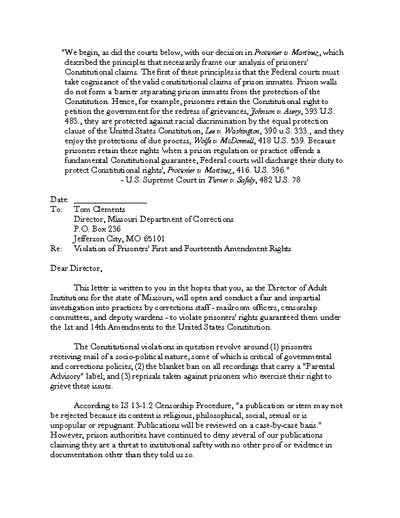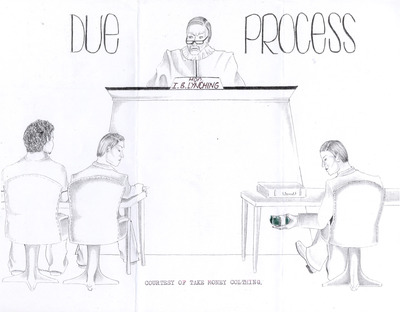On 4 February 2011, I received a Memorandum and Order regarding the
Motions of Summary Judgment on the suit that I filed on two issues of
Under Lock & Key (February 2008 and September 2008) that
were censored, and four pamphlets from Kansas Mutual Aid (KMA). In
short, summary judgment was granted on the two ULK issues.
On the February 2008 issue, the court ruled that “the first article in
the publication discusses the rate of imprisonment across the United
States for different races. Other articles highlight how the prison
system is otherwise unfair to African-Americans and promotes ‘modern day
slavery.’” On the September 2008 issue, the court concluded that “the
publication does appear to encourage prisoners to ‘fight back’ and
‘unite against the unjustice [sic] system.’” Of course, the court took
these statements out of the context in which they were written and
implied.
When the order was received, I was doing a 30-day hit in Administrative
Segregation without any of my legal materials and didn’t have the
opportunity to file a notice of appeal. At the same time, the Federal
8th Court of Appeals has consistently ruled against us on these issues
and most likely would have upheld the lower court’s ruling and hit me
for another $455 for filing the appeal.
Their Motion for Summary Judgment on the four KMA booklets was denied
without prejudice and they were given the option to file another pending
further information. They have subsequently filed said motion and,
because of the way the courts have already ruled, I expect that the
court will grant their motion. I really don’t expect this case will
proceed further, although I am going to file a motion in opposition to
their motion for summary judgment.
A tactical victory would have certainly been a good thing. On the same
token, a lesson still comes out of this – that comrades must not be
thinking and acting as though we are really protected by the U.$.
Constitution, state and local statutes, and the myths and lies fed the
settlers and colonies of the empire about Amerikkkan “democracy” and
other such nonsense.
I will however continue to fight any new instances of censorship that
may arise and continue to agitate, educate and organize on this and
other issues.
MIM(Prisons) Legal Coordinator responds: Here the 8th Circuit
Court of Appeals – which governs the states of Missouri, Minnesota,
Iowa, Nebraska, Arkansas, and the Dakotas – has protected a censorship
incident which might otherwise be deemed illegal in another Circuit or
at the Supreme Court. Thornburgh v. Abbott, 490 U.S. 401
concluded that “Wardens may not reject a publication ‘solely because its
content is religious, philosophical, political, social[,] sexual, or . .
. unpopular or repugnant,’. . .” In the 9th Circuit, “Prison authorities
cannot rely on general or conclusory assertions to support their
policies,” Walker v. Sumner (9th Cir. 1990) 917 F.2d 382, 385,
and “Unsupported security claims couldn’t justify infringement on First
Amendment rights,” Crofton v. Roe (9th Cir. 1999) 170 F.3d 957.
Facts in Under Lock & Key on the reality of the Amerikan
prison system are no different than what one would find in any halfway
decent mainstream newspaper. Any connection one might claim between
these facts and a “threat to the security of the institution” is
absolutely unsupported, conclusory, and based on gross generalizations.
Anyone who has read one full issue of Under Lock & Key
knows that the reason given by the 8th Circuit Court of Appeals for
denying the February 2008 issue is taken completely out of context, like
this comrade says. MIM(Prisons) is constantly putting forth the line
that armed struggle under unfavorable conditions should be avoided if at
all possible; any fighting back we may advocate is only within legally
acceptable means, like lawsuits. More clearly explained in
Under Lock &
Key issue 7 (March 2009),
“MIM(Prisons) only engages in and promotes legal means of combating
injustice. When the prison staff represses every educational and legal
outlet for prisoners to redress their complaints then it is clear what
kind of strategies they are promoting. In those prisons, we predict
there will be violence, and they cannot blame it on us because they have
kept us out. This is similar to what we say about all struggles for
justice around the world. We believe violence is necessary to end
injustice because history has demonstrated that the oppressor never
stops oppressing any other way. We do not want or promote violence, we
are merely stating our conclusion from reading history. In every case of
revolutionary war, it was up to the oppressor to decide whether violence
was used or not. History shows that the same has been true in the prison
rights movement; the struggle for prisoner rights has
only become violent when the state initiated such
violence.”
Regarding the censorship of the September 2008 issue for calling on
prisoners to unite against injustices: anyone who has read a few issues
of Under Lock & Key knows that unity against the injustice
system is the quickest way to reduce violence in prisons and on the
streets. The article
Peace
in the Streets, also from ULK issue 7, shares a bit of the
history of the many efforts made by lumpen organizations to join
together for peace, and the efforts of the pigs to shut it down. In
2006, the
Pelican Bay
State Prison Peace Talks were underway in Crescent City, California;
“I was able to bring all relevant parties to the table, a peace plan was
adopted and a cease fire was implemented.” There, also, the pigs
undermined the unity.(1)
More recently, comrades all across the country have come together to
develop and sign on to the
United Front
for Peace in Prisons. This United Front (UF) is an effort to stop
the unnecessary killings and divisions in the prison environment which
lead to our destruction. Interestingly, one of the points of unity of
the UF is Growth, with emphasis on education. The pigs don’t recognize
this, but we know from experience and our study of history that
political education leads to peace amongst the oppressed. Far from being
censored, Under Lock & Key should be distributed widely to
prisoners in the United $tates, because it will have a direct impact on
the safety and security of the actual people in the prisons every day,
including the guards.
This comrade has adopted a positive and correct attitude in the face of
disappointment and censorship. Even though s/he is unable to receive
these two issues of Under Lock & Key, s/he has not lost h
commitment to apply science to strategy; h Plan B isn’t to lash our or
give up. More of us should follow h example and put science and the
study of correct strategy, not emotions, at the forefront of our
political work.











